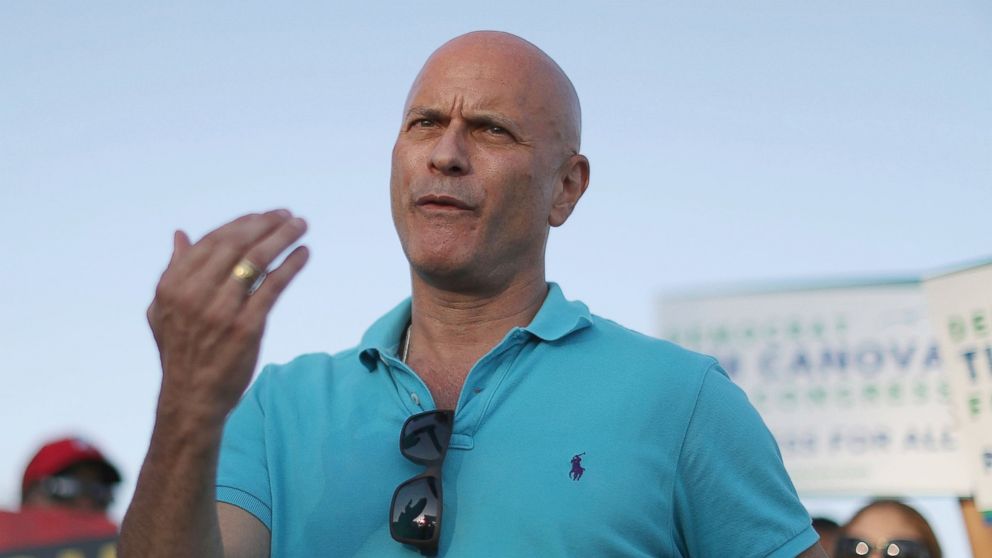Former DNC Chair's Primary Opponent Talks Future of Democratic Party
Before his congressional race, Tim Canova was an unknown law professor.

— -- Bernie Sanders sent shock waves through the Democratic Party last May when he formally endorsed Tim Canova, the primary opponent of Rep. Debbie Wasserman Schultz, at the time the chairwoman of the Democratic National Committee.
Months later, Wasserman Schultz’s resignation from the top party post, on the eve of the party’s national convention, has catapulted her primary race back into the national headlines.
With the help of Sanders’ backing — and thousands of small donations to fuel his campaign — Canova says he is within “striking” distance of his opponent.
Before his Florida congressional race, Canova was a relatively unknown law professor. He served on an advisory committee for Sanders that focused on reforming the Federal Reserve and gets animated talking shop about payday lending regulations, private prisons and restoring Florida’s marshlands.
He says that Sanders’ endorsement “came out of the blue” and that he was surprised the Vermont senator was willing to “go out that limb.”
Here’s more of our conversation with Tim Canova, Democratic candidate in Florida’s 23rd Congressional District.
How are you using all the money you have raised?
In so many different ways. We built up a great field operation. We have four field offices — which I don’t know if there are any other House races in the country that have so many. So were knocking on a lot of doors, doing a lot of phone backing, direct mail pieces. We have been on TV and radio for the last three weeks. We are communicating to voters in a lot of different ways.
What was your reaction to the convention and Wasserman Schultz’s resignation?
I thought it was sad but not surprising. I think she brought it all on herself. I think it has shown her to be exactly what I have been saying — an incredibly divisive DNC chair.
[Sanders] could have blown up the party, and a lot of folks wanted him to. A lot of folks felt he would have been justified just to walk away from things the way they were, but he acted very much like a statesman, a party leader and a patriot, and he did what was in the best interest of pulling the party together.
And you contrast that with the legacy of Wasserman Schultz at the DNC, and it is like night and day.
Your own polls still have you trailing by 8 points. How do you make that up before the primary?
Oh, I don’t think it is going to be that tough to make it up in a month. [Wasserman Schultz's] approval rating has nosedived in the past week or two, and we made a lot of gains in the past couple of weeks. The reality is our ad campaign and the free media we are getting — all of that is helping, and I see the energy coming our way every day. This race is tightening quickly.
How do the issues at the DNC relate to Wasserman Schultz’s ability to do her job in Florida?
First, I would say she has not been representing her district very well at all. Last year she had the highest absentee rate out of anyone in the Florida delegation other than Sen. Marco Rubio, who was running for president.
What is the status of your complaint with the Federal Election Commission against her?
When we started looking into the WikiLeaks emails … I know my name comes up dozens and dozens of times. It seems [Wasserman Schultz] was using DNC resources to monitor and try to crush my campaign, and that is the basis of the FEC complaint that we were drafting. Basically, that it is a violation of federal law.
Will it be filed before the primary?
It is not going to be heard by the FEC right away, but our lawyers [are] hopefully finalizing the complaint, and it will be filed.
I’ll just add that [the presidential race] might all hinge on Florida. Hillary [Clinton] is going to have to win Broward County by 200,000 to 250,000 votes [to win the state]. You take a look at Broward County and the district — this is one of the bluest districts in the bluest counties in the state, and they have among the lowest voter participation rate in the entire state.
When we saw how high Sen. Sanders is flying in the polls here, we were very excited about that. He lost this district badly, but he didn’t show up in a way. He didn’t spend the resources on the ground. Hillary Clinton had a lot of field offices. She won this district, and the conventional wisdom was, well, if Hillary won the district, that means Debbie should win the district. Well, Debbie is not Hillary.
Sanders called you after he endorsed you. What was that conversation like?
I told him the reason I had got into this race was because he had inspired me and many others to step up. He asked about my race and how it was going, and I filled him in. We said we would talk again in the future.
I think the next day he sent out a fundraising email for me to his list. The day he endorsed me we brought in over $250,000 in one day.
Sanders has said he wants to spend his time helping other progressives run for office. What do you think about that?
I am so enthusiastic that that is what he wants to do.I would love to see more progressives run for office. The Democratic Party has fallen on the tracks in many ways. It has become way too corporate dominated. Its agenda has moved in that direction. I think our race becomes a model of progressives stepping up and challenging incumbents in primaries.
Editor's note: Wasserman Schultz did not respond to a request for comment for this story.




